Johor-Singapore SEZ: International firms call for reduced red tape, improved infrastructure for zone to be a success
While recognising Johor’s potential to become an economic hub through the proposed SEZ, firms told CNA that the state must introduce more business-friendly measures such as streamlining regulatory processes, offering more tax incentives and improving facilities for data centre operations.
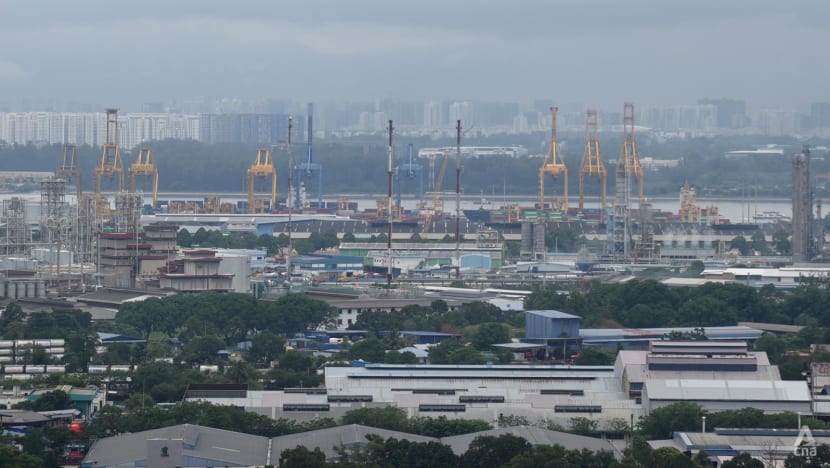
An aerial view of Pasir Gudang, Johor. The area is a logistics hub and adjacent to Pengerang. (File Photo: CNA/Zamzahuri Abas)

This audio is generated by an AI tool.
JOHOR BAHRU: Dutch tank storage company Vopak has long straddled its business on both sides of the Johor Strait. Over the last 30 years, it has based oil and gas operations in both Singapore and Pengerang in the southern part of the Malaysian state.
Now, with discussions over the proposed Johor-Singapore Special Economic Zone (SEZ) advancing, Vopak’s president for business units in Asia and the Middle East expects the areas to become attractive to more foreign companies with stake in the oil sector due to the expected geographical location of the zone.
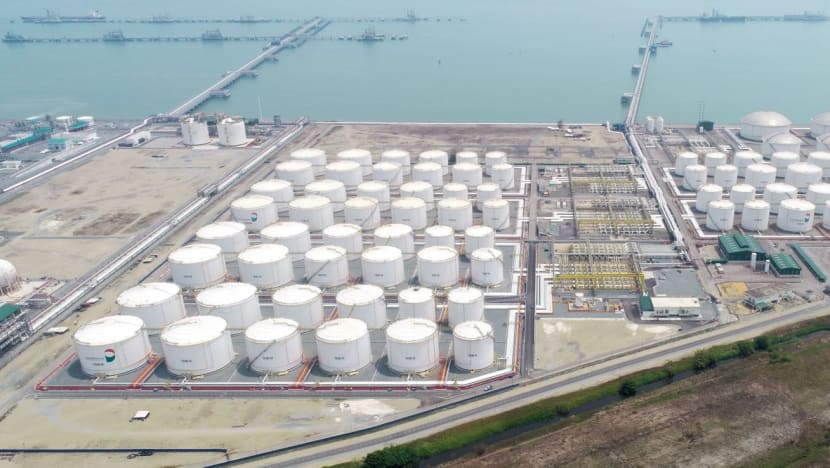
Mr Chris Robblee told CNA that Singapore and southern Johor are strategic locations to house refineries because they are located on major shipping routes and blessed with “deep-water marine accessibility”.
“Both locations complement each other and facilitate the growth of oil trading and refining in the region,” he said.
Several business experts told CNA that the success of the proposed Johor-Singapore Special Economic Zone (SEZ) depends on its ability to woo foreign multinationals’ investment.
This is following Malaysia’s Economy Minister Rafizi Ramli’s recent remarks that it is important that the Johor-Singapore SEZ realises its potential of attracting international investors.
“There will be companies from Singapore coming to Johor, but the bigger potential is companies from all over the world coming to Johor with a view of having the best of both worlds,” he said, referring to Singapore’s sophistication and Johor’s lower costs of operations.
Mr Rafizi pointed out that companies with such intentions, including those keen to navigate geopolitical tensions while finding a base in Southeast Asia, have previously turned to Vietnam.
“With the (Johor-Singapore) JS-SEZ, we can place Malaysia as a competitor to shift investors who previously went to Vietnam to enter Johor and Singapore,” he said.
However, firms and business experts cautioned that Johor must work towards streamlining regulatory processes and improving its infrastructure in the data centre space to cement its status as an attractive location for multinationals with regional offices in Singapore or Kuala Lumpur.
This includes opportunities for companies to launch manufacturing operations, open data centres and build petroleum refineries by leveraging on Johor’s abundant land and cheap cost of doing business.
There are various areas in which the Johor state government can offer incentives to attract more investment, according to Mr Robblee.
He said that Johor can “streamline regulatory processes” by launching a “one stop shop” for permits and approvals as well as ensuring that the processes for decision-making are “transparent”.
“Additionally, (we are hopeful that the SEZ would offer more) tax breaks and exemptions, investments grants and subsidies, low interest loans and financing and provision of incentives for foreign companies to facilitate job creation, transfer of knowledge and upskilling of the local workforce,” he added.
Vopak currently has 76 terminals across 23 countries. When asked if it has plans to expand further in Johor and Singapore if the SEZ comes to fruition, Mr Robblee said “At this stage, it is too early to comment on specific expansion plans.
"However, we are continually evaluating opportunities that align with our business objectives and the evolving economic landscape.”
He added that Vopak currently benefits from Malaysia tax schemes such as the Investment Tax Credit and Pioneer Status Program, but he outlined that additional tax incentives programmes related to infrastructure investments would offer “valuable opportunities”.
OPTIMISM DESPITE POTENTIAL STUMBLING BLOCKS
In January, Singapore and Malaysia signed a Memorandum of Understanding (MOU) on the Johor Singapore SEZ, which is expected to offer both fiscal and non-fiscal incentives such as tax breaks and easier travel between the two countries.
Under the MOU, both sides will work towards increasing the cross-border flow of goods and people and develop a framework that will lead to a full-fledged agreement on the zone.
Johor Chief Minister Onn Hafiz Ghazi said in May that the state government is proposing that the geographical scope for the area within southern Johor be gazetted for the SEZ to encompass a land mass of 3,505 sq km, about five times the size of Singapore.
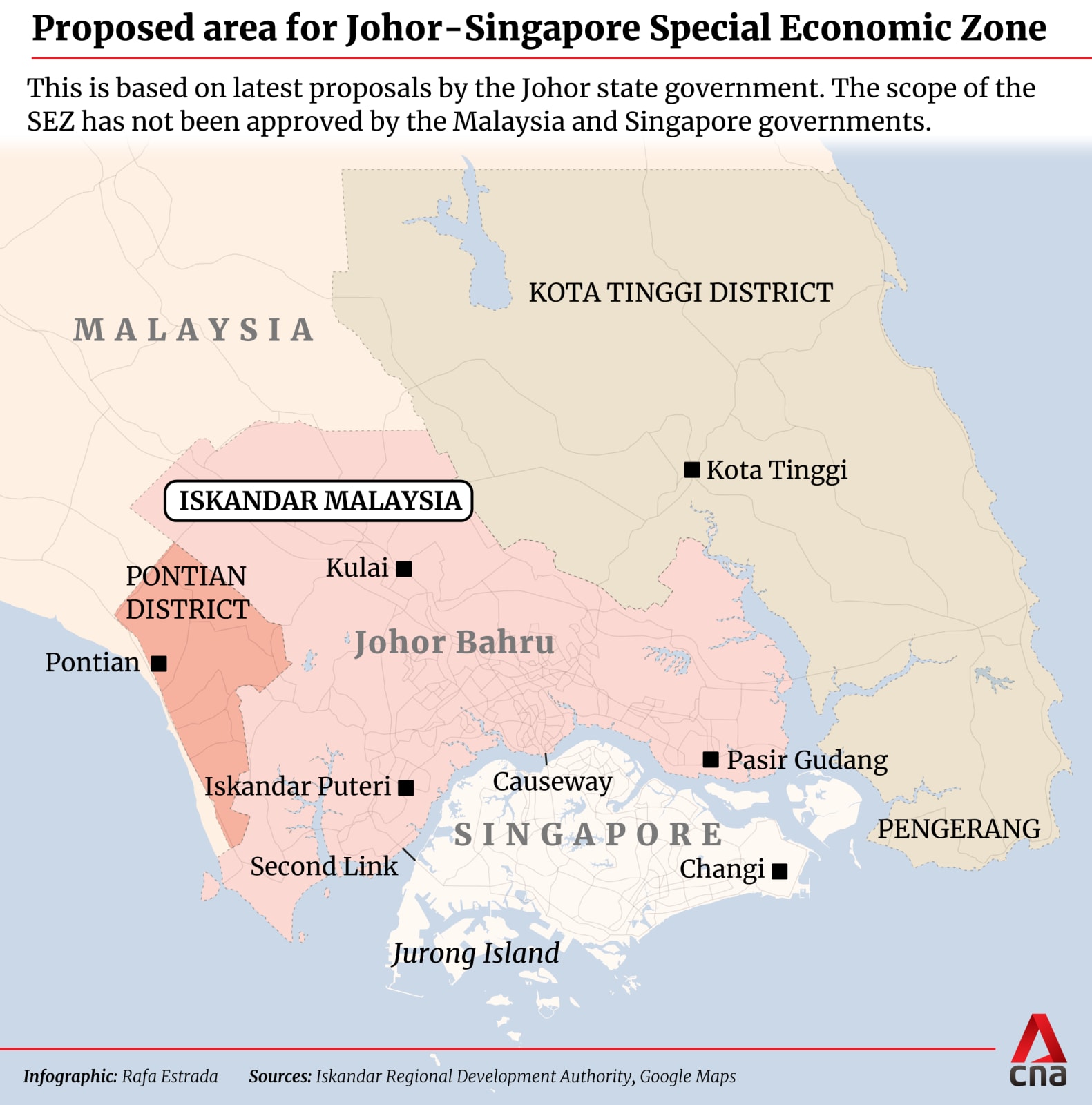
This mass is set to include Pengerang Integrated Petroleum Complex (PIPC) Malaysia's biggest refining and petrochemical complex and has been touted by economists as a potential regional oil and gas hub.
Officials from both countries met in Johor last week to advance discussions on the SEZ where they spoke about issues including ease of doing business and movement of people and goods.
Following the meeting, Singapore’s Ministry of Trade and Industry (MTI) said in a press statement that both countries will work towards inking a definitive full-fledged agreement in the fourth quarter of 2024.
“Both Singapore and Malaysia view the JS-SEZ as a win-win initiative that benefits businesses and communities from both countries,” MTI said.
Plans for the SEZ have been met with optimism by some foreign companies with existing operations in Johor.
China tech giant GDS Holdings announced earlier this year that it has invested RM14.33 billion (US$3.28 billion) in Johor with the opening of its data centres in Nusajaya Tech Park and Kempas Tech Park.
GDS senior vice president of international business Jimmy Yu told CNA that the Johor-Singapore SEZ would enhance interconnectivity and collaboration between both sides, much like the synergy seen in a similar SEZ arrangement between Hong Kong and Shenzhen where the firm has significant operations.
GDS currently operates 18 data centres within the Guangdong-Hong Kong-Macao Greater Bay Area.
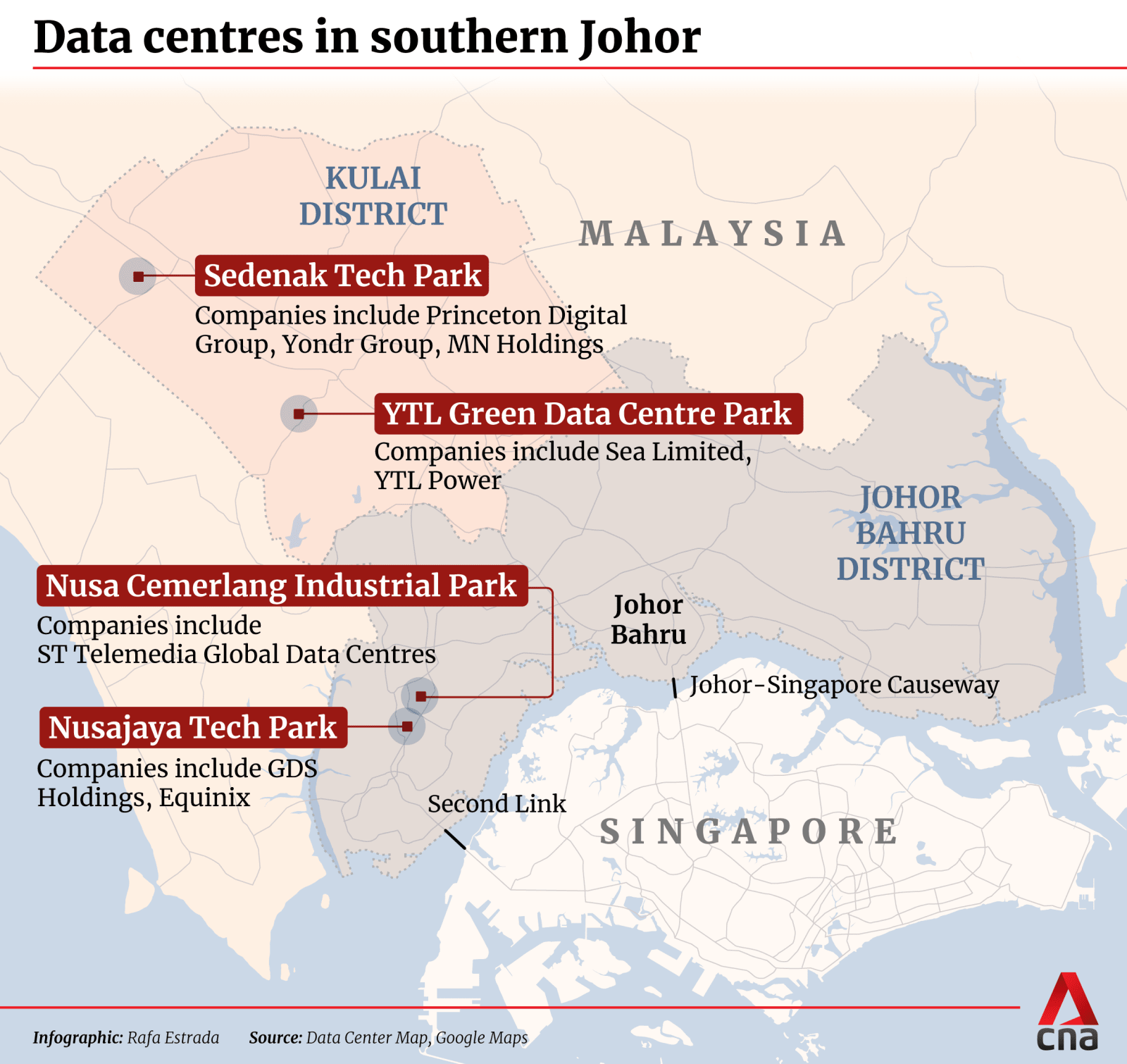
He added that demand for its data centres in Johor has already “exceeded initial expectations”, and the area’s growth is comparable to other growing markets such as in North Virginia in the US, Shanghai or Beijing.
However, Mr Yu stressed that there are some concerns on efficient water management in Johor, a key resource to generate cooling capacity in data centres.
“The data centre industry must adopt innovative solutions, such as water-free cooling technologies, to mitigate these challenges. While Johor has the resources, there is a need for readiness and infrastructure development to handle the increased demand,” he added.
Johor has recently emerged as a well-positioned key regional player in the data centre space, leveraging on its proximity to Singapore's financial hub and comparative advantages such as abundant land and cheaper power.
Global tech firms Nvidia and Microsoft recently announced plans to build data centres in Johor.
However, management and availability of power and water are seen by experts as potential stumbling blocks that could impact operations.
Industry expert Gary Goh, a business development manager of Malaysian data centre advisory firm Sprint DC Consulting, told CNA that the investments of the huge multinational corporations would boost momentum for foreign investments in Johor.
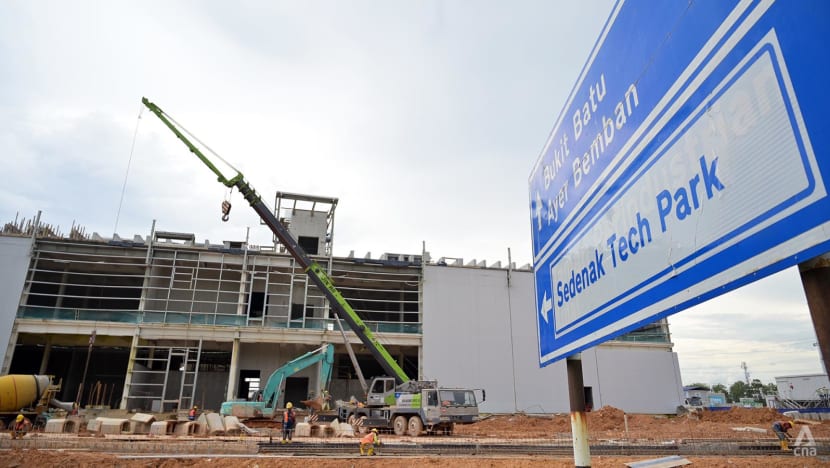
However, he maintained that to facilitate even more investments, the government must accelerate processes for permit approvals, such as for altering land zoning, changing from agricultural to commercial, as well as changing construction approvals.
Mr Goh, who has helped companies set up data centre operations in Johor and Selangor, noted that the latter has a 100-days approval policy set by the state government to facilitate investment for companies.
In contrast, the entire process in Johor may take up to one and a half years.
“The shortest time to process the land permits usually takes months, but it could take years. So companies who are keen to develop data centres are hoping that the processes can be accelerated,” he added.
“If this time can be shortened to even nine months, it will help,” he said.
JOHOR-SINGAPORE SEZ TO FACE COMPETITION FROM THAILAND, INDONESIA
In spite of the challenges, Johor remains attractive due to its comparatively lower costs of doing business.
In a pitch to potential investors at an Invest Johor event last month, Chief Minister Onn Hafiz outlined that the cost of doing business in Johor was 70 per cent cheaper than in Singapore and 30 per cent cheaper than in Kuala Lumpur.
RHB Bank’s managing director of group wholesale banking Fad’l Mohamed told CNA that a significant number of its “high-profile” clients have signalled interest in investing in the Johor-Singapore SEZ.
“With land and cost competitiveness advantages many largest type companies are exploring relocation. Supply chain players, especially those supporting the hyperscalers and data centres, are also eyeing opportunities in the region,” said Mr Fad’l.
Without naming specific companies, he outlined that the profile of multinationals which have signalled interest are in the export manufacturing space, property and even firms keen to set up international schools.
“Whatever model that is looked at at the end, it has to be looked at from a mutually beneficial point of view, a win-win formula for everyone,” he added.
Economist and socio-economic research centre’s executive director Lee Heng Guie told CNA that while the Johor-Singapore collaboration is a win-win for both sides, he acknowledged that the SEZ must be competitive against other similar projects to lure huge foreign companies.
He cited how in August, Malaysian prime minister Anwar Ibrahim presented a collaborative proposal to Thai Foreign Minister Maris Sangiampongsa that could see private companies and start-ups involved in the development of SEZs in southern parts of the kingdom.
Additionally, Indonesia’s coordinating minister for maritime affairs and investment Luhut Binsar was quoted as saying by local media in August that Indonesia was ready to compete with Singapore and Malaysia as they finalised agreements for the Johor-Singapore SEZ.
"I am happy … that we have to be competitive. We are not afraid to compete with them, because we have good strength and credibility, the trust that we have built," he said.
Mr Lee added that there is also talk of another SEZ between Malaysian Borneo state Sarawak and Indonesia’s future capital city, Nusantara in Kalimantan. He stressed that Johor and Singapore must strive to be outstanding amid the stiff competition.
Mr Lee told CNA: “Fighting for investors is competitive, these other potential zones add pressure for the Malaysia and Johor government to differentiate from others to make sure that investors don’t see the upcoming (Johor-Singapore) SEZ as only for smaller firms.”
The data centre consultant Mr Goh outlined that Johor needs to understand its positioning as a supply chain hub to companies with headquarters and main offices in Singapore and Kuala Lumpur.
He cited how US manufacturing firm Flex has a plant in Johor but its main office is in Malaysia’s capital.
“Johor is a manufacturing hub, it's near to ports to export products but when you need headquarter resources like corporate planning, these activities still take place in Kuala Lumpur and the likes of Singapore,” he said.
“The investment of big companies validates Johor as an investment destination but it still needs to procure more power, renewable energy and improve telecommunication services to be a long-term viable investment destination,” added Mr Goh.

















